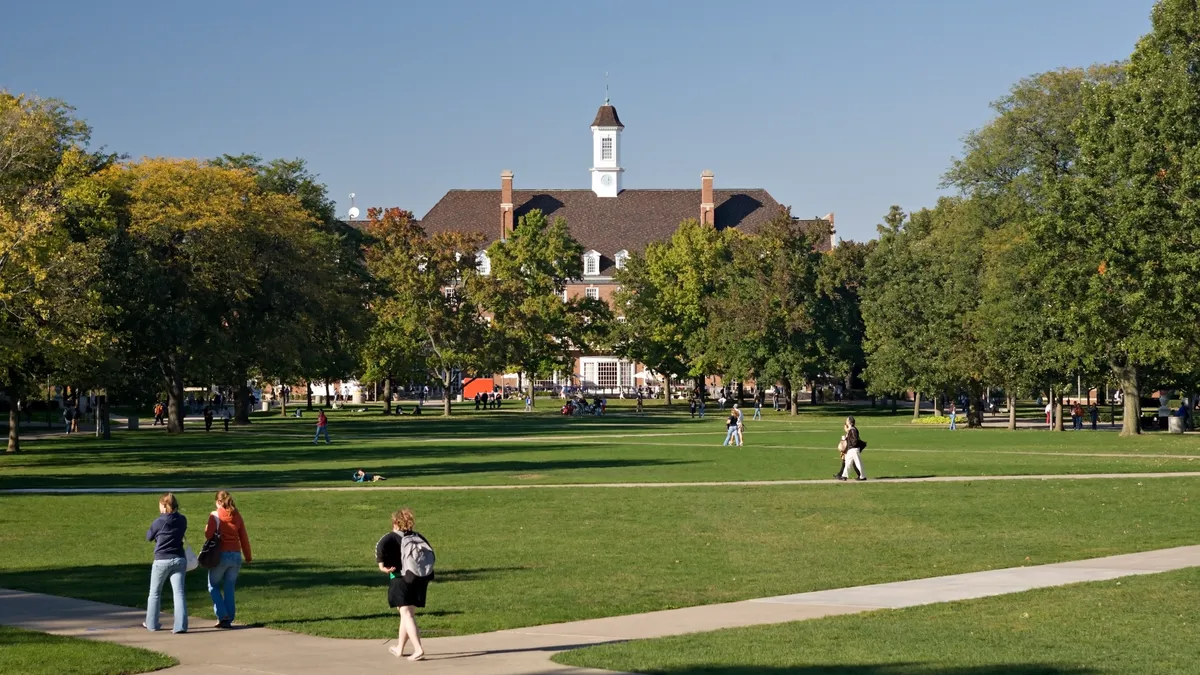Dive Brief:
-
The University of Illinois System has raised tuition and fees for in-state freshmen for the first time in six years, affecting all three of its institutions.
-
Its board of trustees on Thursday approved a 1.8% tuition increase for in-state freshmen at the Urbana-Champaign and Chicago campuses and a 1% increase in Springfield.
-
The move comes amid a growing national debate on college affordability. The trustees also upped the base pay of system President Timothy Killeen from $600,000 to $835,000 and extended his contract through June 2024.
Dive Insight:
U of Illinois is raising tuition to "address critical operating needs" and account for inflation, according to a summary of the increase that was presented to the trustees.
The increases bring annual tuition to $12,254 at Urbana-Champaign, $10,776 at Chicago, and roughly $9,502 at Springfield.
But on the same day it approved the tuition increases, the board also boosted Killeen’s pay from a $600,000 base salary plus a $100,000 performance-based annual bonus to a flat $835,000 in cash each year, according to a university statement, which notes that the "incentive pay will become part of his base salary."
James Toscano, president of Partners for College Affordability and Public Trust, a group that advocates for lowering college costs, told Education Dive in an email that leaders of the system "should be applauded" for holding the line on tuition for six years.
But it should concern all Illinois residents that the trustees are breaking the trend, even though the increase is below the rise in the consumer price index, Toscano wrote in his email.
"Trustees are sending the wrong message to the public about their priorities by giving a whopping pay increase to the president at the same time they ask students to pay higher tuition bills," he wrote.
The financial summary notes "a challenging fiscal environment in the state," though the Chicago Tribune reported last year that Illinois public colleges and universities got a boost in funding in the last state budget not seen in nearly 30 years.
Higher ed funding rose by more than 8%, or $154 million, the biggest year-over-year hike since 1990, according to the publication. The state’s total higher ed investment is roughly $2 billion.
College leaders have long lamented stagnant or declining state funding. A report last fall from the Pew Charitable Trusts found per-student funding among states dropped by 31% between 2000 and 2015.
But the outlook for the coming years is brighter. State funding was up 5% in 2020, the biggest annual increase in five years, with growth in all but three states, according to the most recent Grapevine report from the Center for the Study of Education Policy at Illinois State University and the State Higher Education Executive Officers Association.
The system has also seen enrollment growth in the last decade, from 76,886 students in the fall of 2010 to 89,270 students in the fall of 2019. System officials have attributed the "record" enrollment spike in the last five years to a tuition freeze that went into effect shortly after Killeen took office. Enrollment grew by 7,420 students from the fall of 2014 — when in-state tuition increased last — to the fall of 2019.
With the ballooning costs of college, individual institutions and systems have looked to tuition freezes to attract students.
Virginia was able to keep tuition flat for in-state students for the first time in two decades last year with a $53 million cash infusion from the state.
Pennsylvania also recently froze tuition for the first time in 20 years for its system of 14 public colleges and universities. One member of the Pennsylvania State System of Higher Education board of governors called it "a dramatic move," according to The Philadelphia Inquirer.
Several states have also invested in tuition-free programs for community colleges in the hopes of making higher ed more affordable. And the concept has expanded to four-year institutions as well, with several in the last few years adding or expanding tuition support for low-income students. Among them is the University of Illinois at Urbana-Champaign, which this past fall began offering free tuition to in-state freshmen whose families make less than $61,000 a year.










